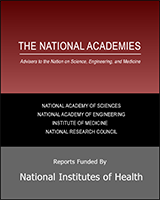NCBI Bookshelf. A service of the National Library of Medicine, National Institutes of Health.
Excerpt
Rapid advances in biomedical research have drawn attention to the critical need for an effective clinical trial system that can generate the evidence needed to translate discoveries into improved patient care, and illuminate targets for further innovation. There is growing recognition, however, that the U.S. clinical trial enterprise is unable to keep pace with the national demand for actionable research results, and inefficiencies in the clinical trial enterprise limit our ability to realize the clinical benefits of scientific discovery. Many clinical trials never meet their recruitment goals and others are accruing patients far too slowly. In addition, the divide between clinical research and clinical practice is growing wider—physicians working in real world clinical care settings are removed from the clinical trials on which medical evidence and care choices are ideally made. Successfully engaging the broader public (including patients and communities) and medical professionals (community physicians and those practicing in academic medical centers) in the clinical trial enterprise is a significant challenge.
In light of these current challenges to clinical trials in the United States, this collaboration between the IOM (Institute of Medicine) Forum on Drug Discovery, Development, and Translation and Mount Sinai School of Medicine seeks to engage stakeholders and experts in an open discussion of current challenges and potential solutions to improving the capacity for efficient conduct of clinical trials in the United States through enhancing public engagement.
Contents
- THE NATIONAL ACADEMIES
- PLANNING COMMITTEE FOR THE WORKSHOP SERIES ON IMPROVING THE CLINICAL TRIAL PROCESS IN THE UNITED STATES
- FORUM ON DRUG DISCOVERY, DEVELOPMENT, AND TRANSLATION
- Reviewers
- Acronyms
- 1. Introduction
- 2. Framing the Problem
- 3. Recruitment Challenges in Clinical Trials for Different Diseases and Conditions
- 4. Models for Public Engagement
- 5. Messages and Methods for Public Engagement
- 6. The Media
- 7. Novel Clinical Trial Designs
- 8. The Health System’s Structure and Culture
- 9. Toward a Patient-Centered Strategy for Clinical Trials
- References
- APPENDIXES
Rapporteurs: Victoria Weisfeld, Rebecca A. English, and Anne B. Claiborne
This study was supported by contracts between the National Academy of Sciences and Department of Health and Human Services (Contract Nos. N01-OD-4-2139 TO No. 158 and HHSF223001003T), American Society for Microbiology; Amgen Inc.; Association of American Medical Colleges; Bristol-Myers Squibb; Burroughs Wellcome Fund; Celtic Therapeutics, LLLP; Critical Path Institute; Doris Duke Charitable Foundation; Eli Lilly and Co.; FasterCures; Foundation for the NIH; Friends of Cancer Research; GlaxoSmithKline; Johnson & Johnson; Merck and Co., Inc.; Novartis Pharmaceuticals Corporation; and Pfizer Inc.
Suggested citation:
IOM (Institute of Medicine). 2012. Public Engagement and Clinical Trials: New Models and Disruptive Technologies: Workshop Summary. Washington, DC: The National Academies Press.
Any opinions, findings, conclusions, or recommendations expressed in this publication are those of the authors and do not necessarily reflect the view of the organizations or agencies that provided support for this project.
NOTICE: The project that is the subject of this report was approved by the Governing Board of the National Research Council, whose members are drawn from the councils of the National Academy of Sciences, the National Academy of Engineering, and the Institute of Medicine.
- NLM CatalogRelated NLM Catalog Entries
- Review Transforming Clinical Research in the United States: Challenges and Opportunities: Workshop Summary[ 2010]Review Transforming Clinical Research in the United States: Challenges and Opportunities: Workshop SummaryInstitute of Medicine (US) Forum on Drug Discovery, Development, and Translation. 2010
- The NCI All Ireland Cancer Conference.[Oncologist. 1999]The NCI All Ireland Cancer Conference.Johnston PG, Daly PA, Liu E. Oncologist. 1999; 4(4):275-277.
- Japan as the front-runner of super-aged societies: Perspectives from medicine and medical care in Japan.[Geriatr Gerontol Int. 2015]Japan as the front-runner of super-aged societies: Perspectives from medicine and medical care in Japan.Arai H, Ouchi Y, Toba K, Endo T, Shimokado K, Tsubota K, Matsuo S, Mori H, Yumura W, Yokode M, et al. Geriatr Gerontol Int. 2015 Jun; 15(6):673-87. Epub 2015 Feb 5.
- American Society of Clinical Oncology policy statement: oversight of clinical research.[J Clin Oncol. 2003]American Society of Clinical Oncology policy statement: oversight of clinical research.American Society of Clinical Oncology. J Clin Oncol. 2003 Jun 15; 21(12):2377-86. Epub 2003 Apr 29.
- Review Envisioning a Transformed Clinical Trials Enterprise in the United States: Establishing An Agenda for 2020: Workshop Summary[ 2012]Review Envisioning a Transformed Clinical Trials Enterprise in the United States: Establishing An Agenda for 2020: Workshop SummaryInstitute of Medicine (US). 2012
- Public Engagement and Clinical TrialsPublic Engagement and Clinical Trials
- PREDICTED: Homo sapiens semaphorin 6D (SEMA6D), transcript variant X11, mRNAPREDICTED: Homo sapiens semaphorin 6D (SEMA6D), transcript variant X11, mRNAgi|1034591998|ref|XM_017022619.1|Nucleotide
- PREDICTED: Homo sapiens semaphorin 6D (SEMA6D), transcript variant X18, mRNAPREDICTED: Homo sapiens semaphorin 6D (SEMA6D), transcript variant X18, mRNAgi|1034592005|ref|XM_017022621.1|Nucleotide
- Homo sapiens zinc finger protein 100 (ZNF100), transcript variant 1, mRNAHomo sapiens zinc finger protein 100 (ZNF100), transcript variant 1, mRNAgi|194018564|ref|NM_173531.3|Nucleotide
- neurotensin receptor type 1 [Homo sapiens]neurotensin receptor type 1 [Homo sapiens]gi|110611243|ref|NP_002522.2|Protein
Your browsing activity is empty.
Activity recording is turned off.
See more...
